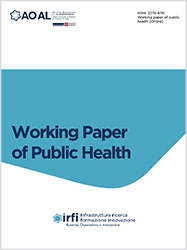Psychological intervention on children and adolescents with parents hospitalized in resuscitation in the hospital of Alessandria, Italy

Accepted: 5 September 2016
All claims expressed in this article are solely those of the authors and do not necessarily represent those of their affiliated organizations, or those of the publisher, the editors and the reviewers. Any product that may be evaluated in this article or claim that may be made by its manufacturer is not guaranteed or endorsed by the publisher.
Objectives: In light of the theoretical and clinical background of posttraumatic disorders, the article will propose an intervention with children and family members of inpatients in the intensive care unit. Methodology: Structure of the intervention: psychoeducation on the consequences of exposure to a critical event; analysis of the functioning/needs of the healthy adult and its ability to be, despite the difficult situation, a safe base; evaluation of the presence of a social network of support; co-construction, together with the adult, of the narrative of communication to the child/adolescent; evaluation of the moment in which it is appropriate for the healthy adult to make the communication; preparation of the child, integrating TCC and EMDR, for the meeting with the parent. Results: The intervention, carried out on 15 families, helped parents and children to deal with a critical situation. Conclusion: In some occasions, communication must be carried out in an emergency/urgency, since the clinical conditions of the hospitalized family member are extremely serious and with an inauspicious prognosis that can degenerate in a short time. This intervention, however, can give the caregiver the perception of having been a secure base for the child in this difficult and delicate situation in his/her life history.
PAGEPress has chosen to apply the Creative Commons Attribution NonCommercial 4.0 International License (CC BY-NC 4.0) to all manuscripts to be published.

 https://doi.org/10.4081/wpph.2016.6865
https://doi.org/10.4081/wpph.2016.6865




